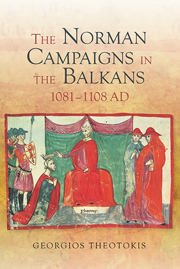Book contents
- Frontmatter
- Contents
- Acknowledgements
- List of abbreviations
- Map I Southern Italy and Sicily
- Map II The island of Sicily
- Map III The southern Balkan peninsula
- Genealogical table: The Norman dukes
- Dedications
- Introduction
- 1 Primary Sources and the Problems of Military History
- 2 Norman Military Institutions in Southern Italy in the Eleventh Century
- 3 The Byzantine Army of the Tenth and Eleventh Centuries
- 4 The Byzantine Naval Forces of the Tenth and Eleventh Centuries
- 5 The Establishment of the Normans in Southern Italy and Sicily
- 6 Robert Guiscard's Invasion of Illyria
- 7 The Norman Advances in the Balkans and the End of the Dream
- 8 Bohemond of Taranto and the First Crusade
- 9 The Count's Campaign of 1107 and the Treaty of Devol
- Conclusions
- List of Byzantine Emperors
- The Hauteville family
- Glossary
- Bibliography
- Index
Introduction
Published online by Cambridge University Press: 05 October 2014
- Frontmatter
- Contents
- Acknowledgements
- List of abbreviations
- Map I Southern Italy and Sicily
- Map II The island of Sicily
- Map III The southern Balkan peninsula
- Genealogical table: The Norman dukes
- Dedications
- Introduction
- 1 Primary Sources and the Problems of Military History
- 2 Norman Military Institutions in Southern Italy in the Eleventh Century
- 3 The Byzantine Army of the Tenth and Eleventh Centuries
- 4 The Byzantine Naval Forces of the Tenth and Eleventh Centuries
- 5 The Establishment of the Normans in Southern Italy and Sicily
- 6 Robert Guiscard's Invasion of Illyria
- 7 The Norman Advances in the Balkans and the End of the Dream
- 8 Bohemond of Taranto and the First Crusade
- 9 The Count's Campaign of 1107 and the Treaty of Devol
- Conclusions
- List of Byzantine Emperors
- The Hauteville family
- Glossary
- Bibliography
- Index
Summary
Here lies the Guiscard, the terror of the world.
From the City, the king of the Italians and Germans he hurled.
Neither Parthians, Arabs, nor the army of Macedon could Alexius free,
Only flight: for Venice could prevail neither flight nor the sea.
One of the most fascinating episodes of European history is the story of the small band of Norman pilgrims who, in the year 1000 (according to one account), took part in the siege of the Italian city of Salerno against the marauding Arabs of the Tyrrhenian Sea, who were demanding an annual payment from the inhabitants of the city. Ironically, they liked what they found there and they decided to tell their comrades back home about the land of Apulia; a ‘land flowing with milk and honey and so many good things’. They returned in the following decades to find employment in the armies of all political entities in the region, along with ample opportunities to quench their thirst for money, land and – according to the so-called Norman myth propagated by contemporary Norman chroniclers – fame, as warriors of great martial valour in the fields of battle. Setting aside the romanticised story of ‘soldiers of fortune’, what could be said of the actual geo-political significance of their establishment in the Mediterranean?
The Norman expansion in eleventh-century Europe was a movement of enormous historical importance, which saw men and women from the duchy of Normandy settling in England, Apulia, Calabria, Sicily and the principality of Antioch. The Norman establishment in the south is particularly interesting, because it represents the story of a few hundred mercenaries who managed to subdue local Lombard princes, drive out Byzantine and Muslim rulers who had ruled the areas for centuries, establish a principality in the Middle East during the turbulent period of the crusades and begin the process of unifying a political entity that would later develop into the kingdom of Sicily.
- Type
- Chapter
- Information
- Publisher: Boydell & BrewerPrint publication year: 2014



